Petra continues to enchant
ANKARA – Anadolu Agency

AA photo
There are few places that get the pulse racing like Petra. Hewn from the rock in the parched land in what is now southern Jordan, the ancient city was the capital of the Nabataeans between 400 B.C. and 106 A.D.
A major tourist draw in the country, the ancient city could soon be drawing even more visitors following the exciting discovery of a monumental structure measuring 56 meters long and 49 meters wide located just 800 meters from the city of the ancient city, according to a recently published study in the Bulletin of the American Schools of Oriental Research.
Found using high-resolution satellite imagery, the site has no known parallel elsewhere in the Nabatean capital.
A nomad clan, the Nabataeans built the ancient city at the end of a narrow canyon, after which the city became rich and bustling thanks to trade.
Petra had been the capital of the Nabateans until it was conquered by the Roman Empire, and then it was abandoned because of natural disasters and economic problems.
The city had been known only by nomadic Arabs until it was rediscovered in the 1800s.
On Dec. 6, 1985, UNESCO included the ancient city of Petra in the World Heritage List and the city was selected as one of the Seven Wonders of the World on July 7, 2007.
Home to theaters carved in sandstone rock blocks, temples, shelters, graves, water channels and primitive dams, the ancient city of Petra’s best known places are al-Hazne and the amphitheater.
Al-Hazne, which is reached after two-kilometer walk through a narrow canyon, has various sculptures and figures, while a 40-meter-high and 25-meter-wide magnificent structure with big columns draws thousands of tourists every year.
Phaeton tours in canyon
Visitors can purchase multiple-day entry passes to the ancient city, given that it takes many day to visit all the places of note at the sprawling site.
The canyon can be toured on camels, donkeys, horses or phaetons, with many locals making a living on the resultant tourist trade.
Surrounded by rock masses in various colors, the canyon also offers a visual feast to tourists with its shapes formed by winds and water.
Locals generally sell their products in empty areas around al-Hazne and the amphitheater, with pieces made of colored sand among the most popular gifts in Petra.
The ancient city is at the same time a natural film setting and has been depicted in many blockbusters, including “Indiana Jones and the Last Crusade,” starring Harrison Ford, as well as “The Mummy Returns.”
Security is provided by mounted police groups in Petra.
